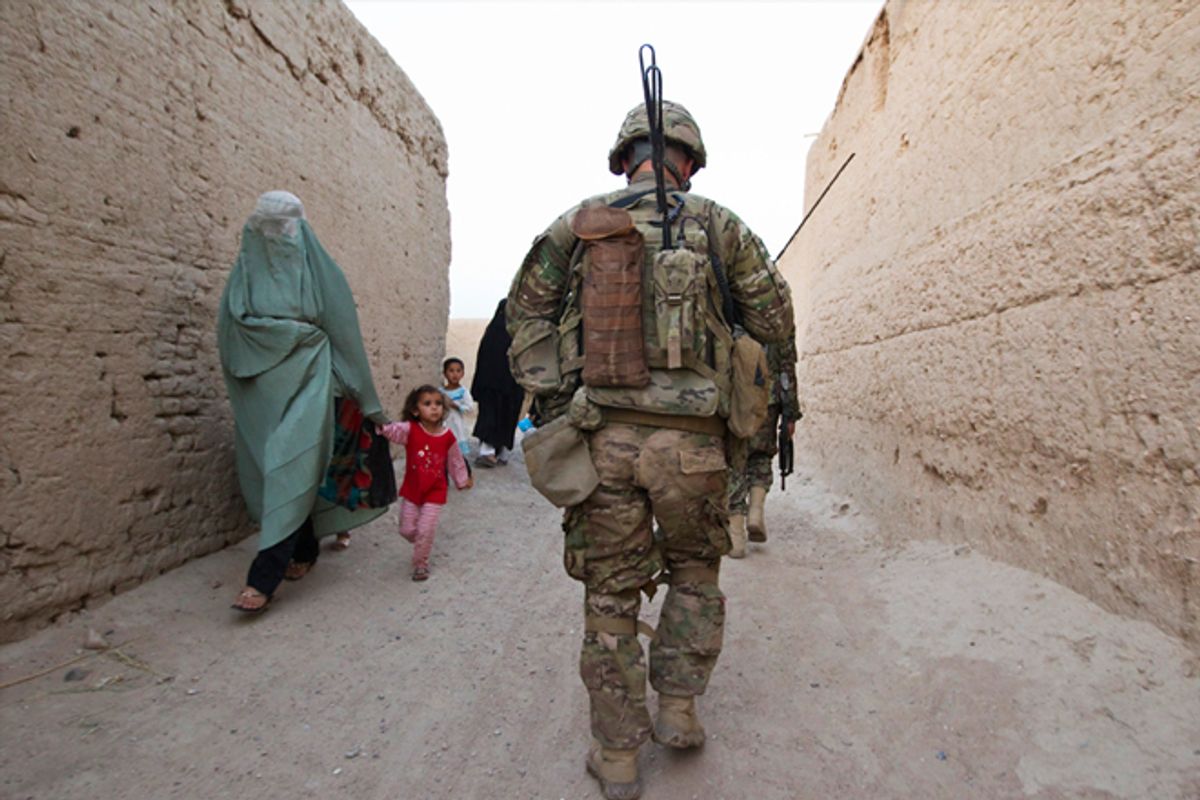Just short of 400 Americans have died fighting in the Afghanistan War over the past year. That may not make it the most important issue in the 2012 election cycle, but one would think it makes it, well, an issue. Mitt Romney certainly thinks so – he’s criticized Barack Obama on it, and his web site dedicates a page to Afghanistan and Pakistan. Democratic candidates for Senate think so, too. But Republican candidates for Senate? They’ve gone totally AWOL on this one.
Of the 16 Republican candidates most likely to win Senate elections this year, 15 of them totally ignore Afghanistan in the issues section of their campaign web pages. Not one word.
That’s significantly different than what Democratic candidates are up to on the issue. Most of the 13 Democratic candidates who are most likely to win had at least some mention of Afghanistan, with views ranging from moderate support for staying and finishing to the job to mild support for the current scheduled withdrawal to three who simply want to get out now.
But the Republicans? Only one, Arizona member of Congress Jeff Flake, mentioned the place, at least as far as I could see. Even he didn’t exactly have a clear position -- he’s more or less in favor of staying, but doesn’t quite say that. But at least he acknowledges that it’s going on.
And it’s not as if Republicans are substituting other foreign policy or national security issues. Here’s a typical position statement, this one from Nebraska’s Deb Fischer:
The most important job of the federal government is to keep us safe and secure. Our brave men and women in uniform perform their duty to protect all of us admirably and effectively. In the Senate, I will not play politics with our security and our troops. I will give our military the tools they need to keep America safe and free, and I will ensure our troops and their families are supported and that their needs are met.
America cannot allow nuclear arms to get in the hands of terrorist states or allow rogue nations to threaten or bully others with nuclear threats. That is why we must fight – and win – the war on terrorism. To succeed in this mission, fighting terrorism needs to be the top priority of the federal government, not an afterthought. As your Senator, I will be a strong voice for ensuring that our government never loses focus on its most vital purpose.
Well, there you go: As United States Senator, she’ll totally work to ensure that we defeat all foreign enemies by carefully deploying clichés and meaningless verbiage. And, again, it’s not just her; at least half of the Republican candidates have no more than that on their web pages (compare, for example, North Dakota’s Rick Berg or Todd Akin in Missouri). Once again, it’s not as if the Democrats typically have extensive, well-reasoned positions on everything from China to Yemen, but many of them at least mention one other current issue in addition to Afghanistan. There’s plenty of empty rhetoric, of course – but it’s not all empty rhetoric.
Why have Republicans gone all fraidy cat when it comes to talking about foreign policy and national security?
I think there are a couple of reasons. One is that Barack Obama is generally perceived as successful in that issue area, making criticism relatively difficult. After all, it’s not as if anyone is going to criticize the death of Osama bin Laden (although he was only mentioned by a few Democrats and at least one Republican). Still, even things that national Republicans regularly mention, such as Israel, don’t show up here. (I count one mention of Israel, and Iran is almost completely ignored.)
A second possibility is that Republican candidates are far more hawkish than they believe their constituents are. If Republicans, in fact, support staying in Afghanistan or leaving slowly but also think that swing voters want to get out, then they might avoid the issue. For what it’s worth, candidates currently running in contested primaries (including Flake) seem to be slightly more likely to have something substantive to say on foreign policy, suggesting that perhaps it’s the swing voters in November that they’re worried about.
Or perhaps it’s division within the party. It’s possible that candidates seeking to win Tea Party votes might be scared of both the neocons — who can’t wait to go to war in Iran, Syria, and probably Iraq all over again – and the Ron Paul faction that wants out of everything.
And there’s one other possibility: Maybe some of these candidates and their staffs just don’t know anything about foreign policy. After all, it’s not hard to think of a few reasonably safe issues that Republicans usually run on; I mentioned Israel, but there’s also UN-bashing or building missile defense systems, and hardly anyone has a position on those, either. I have no idea whether Deb Fischer or Indiana’s Richard Mourdock or Ted Cruz in Texas know anything about the world beyond the U.S. For all I know, they have plenty of foreign policy in their stump speeches, but you certainly wouldn’t know it from their web sites.
Whatever the reason, it’s really a sad statement about a party which once considered itself a leader on foreign policy and national security.



Shares